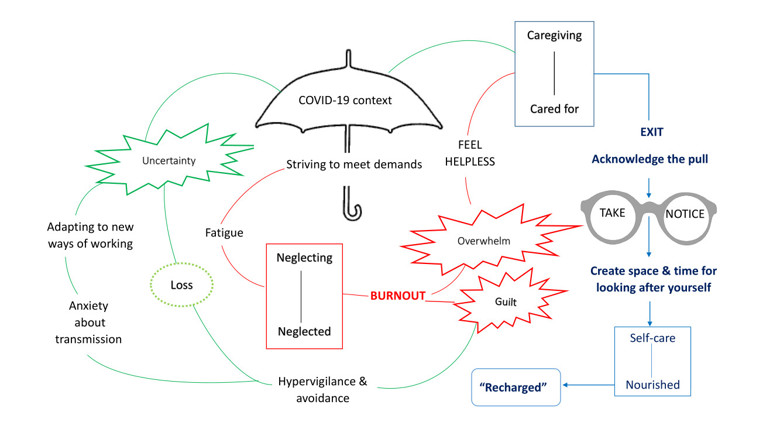Tinlin, Rowan & McElroy, Rebecca, 2022. Developing a more caring and compassionate self-self relationship. Reflections on working through a pandemic from a CAT perspective. Reformulation 55, p 6 - 8.
As the COVID-19 pandemic swept through the world, mental health services were forced to adapt to the ever changing landscape. Some services were paused and psychological therapists were redeployed to work into other areas hit by staff absence or increased demand, and others adapted how they delivered psychological intervention using telephone and video platforms.
Several months after the lockdown restrictions were first announced in the UK, we feel as though we have adapted to this ‘new normal’ everyone speaks of! Speaking to our colleagues and peers, it’s evident that the pandemic has brought with it a huge degree of uncertainty and change, with people experiencing waves of calm amidst the anxiety, as well as extreme care-giving fatigue.
Reflecting on the last six months we are aware of:
a) the consequences on our minds and bodies of working through the pandemic
b) how advocating self-care and wellbeing to others in our day job does not necessarily make us more likely to care for ourselves!
Below, we have shared our stories, reflecting on the parallels between our experiences from a CAT perspective, as well as our shared intention to develop more caring and compassionate self-self relationships within ourselves.
Rowan
My journey began in early March when I caught COVID-19 and found myself pulled away from my rather comfortable and independent caregiving position, and plunged in to a position of needing care. I felt far worse than the media predicted given my age and relatively healthy status and remember feeling frightened by this disparity.
At that time I couldn’t access a COVID-19 test as a community case, however, because two friends that I had been out with had also become unwell and tested positive (one tested positive on admission to hospital and another through the employing NHS trust who were one of the first to test staff), my GP didn’t need a positive test result to begin discussing the unknown complications of COVID-19 with me.
Little did I know then that I would experience waves of symptoms for months to come, constantly pulling me back in to that uncomfortable position of requiring care. Chest pain, palpitations, headaches, breathlessness on walking and a heavy fatigue that made me feel lazy and start to wonder whether this post viral lag would last forever. Thankfully, as I sit down to write this today, I feel well. The only symptoms that remain are guilt and fear: fear of contracting the virus again, and guilt surrounding not being as helpful or productive as I could have been over the last few months.
As I emerged from my period of self-isolation and returned to work in March, the UK entered lockdown. The speed of our service’s response was incredible to witness: additional cleaning procedures introduced overnight, duty rotas created to minimise staff presence in bases, desks were moved, equipment sourced to enable home working and delivery of remote therapy.
At first, I moved to delivering telephone therapy with face-face contact resuming only if essential, and covered different bases within my locality as part of a duty rota response. This all felt very new, but the shared sense of ‘newness’ within my team helped ease my worries about being de-skilled or feelings of helplessness. In my self-other relationships I found myself providing guidance and advice around staying well: such as limiting access to media reports regarding COVID-19, creating routines and plans to minimise uncertainty, finding new ways to connect with others, spending time outdoors and doing physical exercise, using ideas from sleep hygiene, and the importance of sharing difficult feelings. I knew these were important factors for staying well during this strange time, however, I did not bring these suggestions into my self-self relationship at first!
Wearing PPE the first few times created anxiety which I silenced. Travelling to team bases felt wrong as I drove along empty roads and observed everyone in my own social circle staying at home with a pinch of jealousy. Some days I felt exhausted and wasn’t sure if it was the lingering post-viral fatigue or my body’s response to an increase in online and telephone work.
Looking back, COVID-19 increased the demand on my time and energy (both in and outside of work), which made it difficult for me to stay in a caring and compassionate self-self relationship.
Guilt was around at this time with thoughts of ‘I should be better’ which led me to neglect my own experiences and focus on supporting others. But, as the months passed I thought more about the sustainability of being in ‘demand’, and through compassionate conversation with others we have normalised and validated these ‘striving’ or ‘over-caring’ traps.

Rebecca
My journey through the pandemic so far has been quite different. I have an underlying health condition which by definition suggests that I may be at greater risk of complications from COVID-19 should I catch it. I was well supported by my service and line manager and worked from home from early March for 12 weeks straight. Whilst I was very grateful to be given this option, working from home came with its own challenges. Simultaneously I found myself feeling both frightened and anxious about catching COVID-19 and extremely guilty that many of my colleagues were required to continue face to face contact and in my mind, pick up my slack.
As with so many of us who work in mental health professions, I have a strong desire to care for others and often find myself choosing to adopt a caregiving role in relation to others, both in my professional and personal relationships. Working from home, I felt like I had been unceremoniously pulled out of this position. Although I kept in touch with both patients and colleagues via phone and video chat, this didn’t feel like it was enough and I was left feeling helpless and guilty. As a result I started working longer hours at home, striving to get back to that caregiving position. However, working longer, more intense hours, all in front of a computer screen meant that I was more fatigued, spent less time focusing on healthy cooking and exercised less. All of which most likely made me less productive and ironically less fit and healthy, factors which should I have caught COVID-19 may have exacerbated my pre-existing vulnerability. In other words, my drive to be in the caregiving role in my self-other relationships pulled me into a [Neglecting to Neglected] role with myself.
Looking back to the beginning of the pandemic, I could not have imagined that we would still be living through it all these months later. However, reflecting on my experiences from a CAT perspective has been invaluable. I have been able to observe how my own existing drive to care for others was interacting with the novel challenges COVID-19 brought about and I have a greater appreciation for the importance of nurturing a more caring and compassionate relationship with myself.
CAT formulation
Our personal stories are different in content and context. However through reflecting on our journeys together and sharing these with colleagues and peers we have noticed some common themes. Although being in a caregiving role can often bring about positive feelings of competence and appreciation, during the pandemic, striving to provide care for others and not providing ourselves with sufficient care, has been threaded through many of our experiences. This striving has often been accompanied by guilt about taking time off work for ourselves; feeling overwhelmed as we stretch both our limits and boundaries; loss as we swap routines and time with loved ones for working late, cope with changing job roles or observe the sinister side of the virus, and uncertainty and sadness as we become preoccupied with our own and others emotional responses to COVID-19.
As we come to realise that COVID-19 is likely to be around for a long time to come, these conversations have changed in tone and pace, as we learn to adapt.
Slowly and carefully, we have mapped our collective experiences with COVID-19 and have started to explore potential exits from the fatigue, anxiety, self-neglecting and striving patterns.
In conversation with others we explored how looking after ourselves provides space to ‘recharge our batteries’: a metaphor for an exit adopted by one of our community teams, referencing a method of noticing and restoring during the pandemic. By consciously engaging in activities which help us to feel recharged we hope we can approach the coming months with increased awareness and subsequent compassion for ourselves. For Rowan this looks like increased time at the veg plot, walking through the hills with our dog, or simply sitting on the beach with a cup of tea watching the world go by. For Rebecca recharging involves getting lost in a good book, getting stuck into a new box set, or a (socially distanced) catch up with friends.
We wonder what activities recharge your batteries?
We hope that sharing our reflections and learning validates all of our individual and complex journeys through this pandemic and introduces the idea of sustainability for the coming months.
We are making a committed intention to mindfully acknowledge our emotions and pulls as they arise, create space to experience them and look for exits to “recharge”. Therefore, in the spirit of moving towards a ‘self-care -- nourished’ reciprocal role we invite you to use our map and realisations to initiate dialogue with each other and your teams. We hope that as caregivers we are able to continue to share our experiences and learning, and support each other in looking after ourselves as we continue to navigate the ever-changing waters of this pandemic.
Acknowledgements:
We’d like to thank Dr Judi Sharifi for facilitating and supporting reflection within our timely CAT supervision sessions, as well as our colleagues for their willingness to share and reflect with us.
Correspondence:
Rowan.Tinlin@cntw.nhs.uk
Rebecca.McElroy@cntw.nhs.uk


